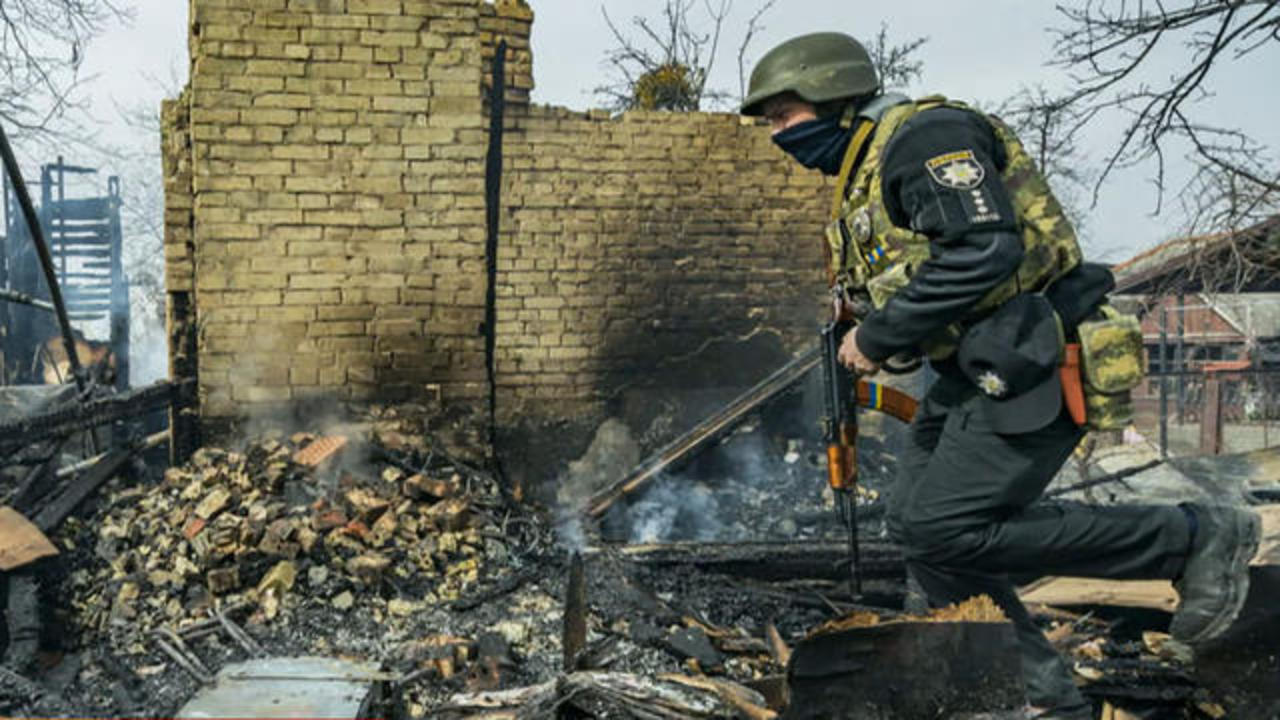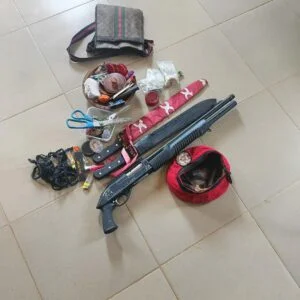Crime
Ukraine calls for Russia to be declared ‘terrorist state’ after damning report

The head of the Office of the Ukrainian Presidency has called for sweeping American and European sanctions targeting Moscow after an official report drawn up by an international working group concluded Russia should now be declared a “state sponsor of terrorism”.
The call from Andriy Yermak, the second most powerful Ukrainian government official after president Volodymyr Zelenskiy, came after Ukraine accused Russia of sabotage of the Nord Stream pipelines, an accusation that adds to its claim that Russia has shown all the characteristics of a terrorist state under US and international law.
Such a designation, resisted so far by the US administration, would allow for secondary sanctions to be imposed on any entity or individual trading or supporting Russia government bodies, including state-owned banks. It would also allow US nationals and employees to sue Russia for money damages or material compensation for personal injury or death caused by the Russian state’s terrorism. Russians seeking to enter the US would face heightened restrictions.
Yermak praised existing sanctions, but said the impact had not been decisive, adding: “It is often said that money is like water: it always finds a way to flow. To combat this, the west needs to double down on existing sanctions.”
READ ALSO: After hurricane knocks out power grid, Cuba is in the dark
He was speaking after a report by an international working group on sanctions advising the Ukrainian government concluded that Russia had reached the legal definition of a “terrorist state” under US and Canadian law. Such a designation has only ever been handed to North Korea, Syria, Iran, and Cuba, and would probably result in Russia’s complete ejection from the financial system, and raise fresh questions about its status as a UN security council member.
The report, drawn up by leading lawyers, economists and diplomats and published on Thursday, said: “The essence of terrorism can be well summarised as ‘premeditated, politically motivated violence perpetrated against non-combatant targets’.”
This satellite photo from Planet Labs PBC shows a large disturbance caused by natural gas leaking into the sea off the coast of the Danish island of Bornholm.
Nord Stream blasts could herald new phase of hybrid war, say EU politicians
Read more
It said horrific events in Ukraine were “not one-off instances [involving] rogue elements of the Russian armed forces” but were “designed and conducted with the specific intent of terrorising the Ukrainian population”. Since the Russian state was the main perpetrator, it went beyond being a sponsor of terrorism, the report said.
The instances cited that could be deemed terrorism include events in the Ukrainian town of Bucha, where international experts found evidence of rape, torture, waterboarding and sexual violence, the firing of Russian missiles at a shopping mall in Kremenchuk, killing at least 20 people and injuring dozens more, and during the siege of Mariupol, when the Russian assault killed as many as 22,000 civilians and destroyed 95% of the city.
It said damage had been inflicted on at least 131,300 civilian homes, 188,100 vehicles, 934 education facilities and 2,472 healthcare facilities.
The report was prepared by a sanctions committee including Michael McFaul, the former US ambassador to Russia and was commissioned by Yermak.
The authors admit that there is a risk that such an extreme measure may prove counterproductive, for instance by scuppering the fragile deal to allow the export of Ukrainian grain through the Black Sea. But they say mitigation measures are available, including a US government statement that its citizens could not sue Russia individually, so eating into Russian state assets held abroad.
The report said “the time for incrementalism is over”. It said: “Through its actions in their war against Ukraine, the Russian Federation has met or exceeded any reasonable legal or policy threshold for designating as a state sponsor of terrorism with respect to other nations and entities currently holding the designation.
“War crimes versus acts of terrorism are distinctions without a difference. The kind, extent, and purpose of premeditated, politically motivated violence that the Russian state is deploying against Ukrainian noncombatants is shocking. It demands a response.”
Crime
Police Foil Cult Initiation in Anambra, Arrest Six Suspects

The Anambra State Police Command has foiled a cult initiation ceremony in Nawfia, Njikoka Local Government Area of the state.
Spokesperson for the Command, SP Tochukwu Ikenga, disclosed this in a statement issued on Tuesday in Awka.
According to Ikenga, the operation was carried out by police operatives around 9:30am on June 15, leading to the arrest of six suspects at the scene.
Recovered during the raid were one Jojef pump action gun, two cartridges, and a golden-coloured Lexus SUV with registration number ATN 202 AE. Other items found include two cutlasses, two scissors, a cap bearing the inscription of the Supreme Vikings Confraternity, charms, and substances suspected to be hard drugs.
“They are currently undergoing police interrogation to get more insight into their modus operandi, after which the case will be charged to court on the conclusion of the investigations,” Ikenga stated.
The police spokesperson reassured residents of the command’s unwavering commitment to fighting cultism and other related crimes across the state.
Crime
Court remands 2 over alleged attempted murder

An Ikeja Magistrates’ Court, Lagos, on Wednesday, remanded two persons, Olaitan Fasasi and Kehinde Tobiloba in a correctional facility over alleged attempted murder.
Fasasi, 40, and Tobiloba, 26, whose addresses were not provided, are being charged with conspiracy, attempted murder and membership of a secret society.
The Magistrate, Mr L.A Owolabi, did not take the plea of the defendants for want of jurisdiction.
Owolabi directed the police to forward the case file to the Director of Public Prosecution for legal advice.
He thereafter adjourned the case until May 31 for mention.
The Prosecutor, Josephine Ikhayere, told the court that the defendants committed the offences at about 5.02p.m on Feb. 15, at Mushin, Lagos.
She said that Fasasi, Tobiloba and others now at large, attempted to commit murder by shooting at a resident, Alfred Ademola.
“They armed themselves with a locally made gun. They belong to Eiye Confraternity, a group proscribed by law,”, she said.
Ikhayere said that the offences contravened Sections 230(1) and 411 of the Criminal Law of Lagos State, 2012.
He said that the actions of the defendants also contravened Section 2(3)(a)(b)(c)(d) of the unlawful societies and Cultism Law of Lagos State Law.
Crime
Man jailed 3 months for stealing mobile phone

An Area Court in Jos, on Tuesday, sentenced one Jeptha John, to three months imprisonment for stealing a Redmi mobile phone valued at N165, 000.
The judge, Shawomi Bokkos, sentenced the John after he pleaded guilty to the offence.
The judge, however, gave the convict an option to pay N20, 000 fine and N50, 000 restitution to the complainant.
Bokkos said that if the convict defaulted in paying the restitution, three months should be added to his sentence to make it six months imprisonment.
Earlier, the police prosecutor, Insp Monday Dabit, told the court that the case was reported at the B Division Police Station, Jos, on Dec. 1, 2024, by Ms Nerat Danjuma.
He said that the complainant alleged that the defendant trespassed into her house and stole her mobile phone valued at N165, 000.
The prosecutor further told the court that the offence contravened the Plateau State Penal Code, Law of Northern Nigeria.
-

 Headlines4 years ago
Headlines4 years agoFacebook, Instagram Temporarily Allow Posts on Ukraine War Calling for Violence Against Invading Russians or Putin’s Death
-

 Headlines4 years ago
Headlines4 years agoNigeria, Other West African Countries Facing Worst Food Crisis in 10 Years, Aid Groups Say
-

 Foreign3 years ago
Foreign3 years agoNew York Consulate installs machines for 10-year passport
-

 News1 year ago
News1 year agoZero Trust Architecture in a Remote World: Securing the New Normal
-

 Entertainment3 years ago
Entertainment3 years agoPhyna emerges winner of Big Brother Naija Season 7
-

 Headlines1 year ago
Headlines1 year agoNigeria Customs modernisation project to check extortion of traders
-

 Economy2 years ago
Economy2 years agoWe generated N30.2 bn revenue in three months – Kano NCS Comptroller
-

 Entertainment2 years ago
Entertainment2 years agoMovie download platform, Netnaija, announces closure













